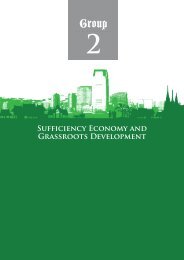Conflict, Legitimacy and Government Reform: Equitable Allocation of ...
Conflict, Legitimacy and Government Reform: Equitable Allocation of ...
Conflict, Legitimacy and Government Reform: Equitable Allocation of ...
Create successful ePaper yourself
Turn your PDF publications into a flip-book with our unique Google optimized e-Paper software.
142 KPI Congress XI<br />
enhanced by a continual process <strong>of</strong> learning correct academic principles.<br />
It also requires creation <strong>of</strong> guidelines to protect judicial independence<br />
founded on belief in the principle <strong>of</strong> separation <strong>of</strong> powers, so judges do<br />
not fall under the influence <strong>of</strong> politics or unjust powers. There must be a<br />
guarantee that courts adhere to neutrality <strong>and</strong> judge without prejudice.<br />
Article 201 <strong>of</strong> the Constitution <strong>of</strong> the Kingdom Thail<strong>and</strong> stipulates that<br />
a judge must take an oath before His Majesty the King, swearing he “will<br />
be loyal to the His Majesty King <strong>and</strong> will faithfully perform my duties in<br />
the name <strong>of</strong> the King without any partiality in the interest <strong>of</strong> justice, <strong>of</strong><br />
the people <strong>and</strong> <strong>of</strong> the public order <strong>of</strong> the Kingdom. I will also uphold<br />
<strong>and</strong> observe the democratic regime <strong>of</strong> government with the King as Head<br />
<strong>of</strong> State, the Constitution <strong>of</strong> the Kingdom <strong>of</strong> Thail<strong>and</strong>, <strong>and</strong> the law in<br />
every respect.”<br />
Political freedoms stipulated in the 1997 <strong>and</strong> 20007 constitutions<br />
have increasingly created a conflict among political groups <strong>and</strong> pressure<br />
groups. The judicial institution must enter to judge the behaviors <strong>of</strong><br />
these individuals or groups <strong>of</strong> the people in politics all the time. Due to<br />
the different characteristics in Thai society, in which a judicial culture has<br />
not yet been firmly rooted, influential people in society have been<br />
allowed to intervene in the process <strong>of</strong> using state power in order to justify<br />
their own actions. Furthermore, there is a limited underst<strong>and</strong>ing <strong>of</strong> new<br />
provisions <strong>of</strong> law, particularly public law, under which various relations<br />
have been set up <strong>and</strong> many mechanisms have established concerning the<br />
use <strong>of</strong> power in the work systems <strong>of</strong> <strong>of</strong>fices in various organizations.<br />
These are very different from what they were in the past. Therefore,<br />
Thail<strong>and</strong>’s judicial institutions like the Constitution Court, the Courts <strong>of</strong><br />
Justice, <strong>and</strong> the Administrative Court must work under the challenging<br />
situation <strong>of</strong> facing constant public criticism, particularly when dealing<br />
with cases concerning political interest that have huge effects in politics,<br />
such as cases concerning removing political <strong>of</strong>fice-holders from their<br />
positions, dissolving, political parties, disqualifying election c<strong>and</strong>idates,<br />
or confiscating assets when courts find the defendant to possess unusual<br />
wealth. All these cases bring criticism <strong>of</strong> verdicts from all sides.














